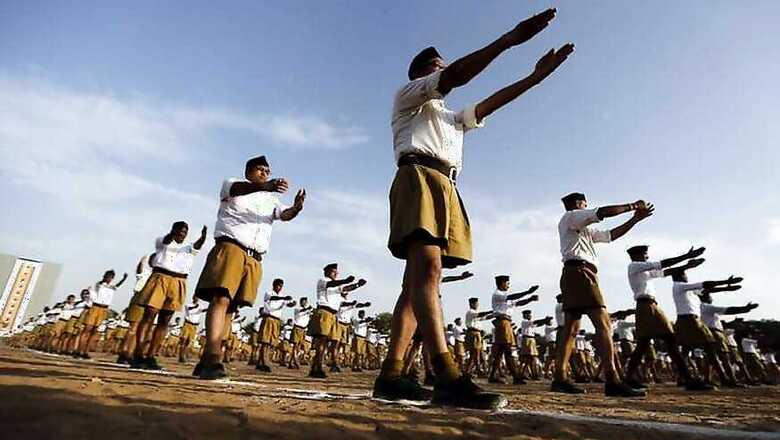
views
New Delhi: As BJP scripts its fairytale in Tripura and Nagaland, the win is complemented by the story of reach and outreach of the Rashtriya Swayamsevak Sangh (RSS). In Tripura alone, the number of RSS shakhas (branches) have increased three-fold in the last three years. News18 maps the growth chart of the Sangh and its political offshoot in the North East.
In 2016, Prachar Pramukh of RSS in Assam, Shankar Das, dispatched a group of 250 workers under the Vistarak Yojna for establishing 125 shakhas in Tripura. Despite major resistance from the administration and other groups active in the region, the Sangh was not deterred from their mission of tapping into the Left Front’s bastion.
There were 80 shakhas of the Sangh in the state in 2015, by the next year, the number had doubled. Now, there are nearly 250 shakhas in the region. “Despite resistance from the Congress, Communists and regional forces, our number of shakhas has only grown. It grew three times in three years. There are certain groups in the North East that have been resisting our presence since the 1970s because we work for the nation,” says Shankar Das.
In the 80s and 90s, members of the Tripura National Volunteers, the National Liberation Front of Tripura and RSS indulged in violent attacks against each other. When the NDA government came to power at the end of the last millennium, regional groups attacked and killed four members of the RSS.
Recalling the names of those murdered, Das says, “What you see happening in Kerala nowadays also took place in the North East. Four of our swayamsevaks, Binendera Dey, Subhankar Chakraborty, Sudhamoy Dutta, and Shamal Sengupta were killed.”
According to the Assam Prachar Pramukh, these regional groups were in conflict with the Sangh because of difference in ideologies. “While the Sangh stands for a Hindu Rashtra (nation), these anti-national organisations articulate separatist sentiments. These extremist groups that ask for Tripuri nationalism are backed by Christians. They wanted to spread their Kingdom of God here, their manifesto says so in as many words. We believe in a united Hindu Rashtra, while they believe in secession and regional nationalism,” says Das.
Son of the RSS Assam prant (province) president, Lankeshwar Dutt, Das says that during his father’s time, the North East had only one prant – in Assam during the 1970s. Six years ago, the region got two more prants, Uttar (North) and Dakshin (South).
Two more prants, Manipur and Arunachal, were added in 2015. The Sangh, though, admits that it does not have a strong presence in Nagaland. Swayamsevaks in the region tell News18 that there are only five shakhas in Nagaland but an expansion plan is in works. The outfit is gaining grounds and a large number of Nagas attended the Sangh’s Luitporiya Hindu Sammelan, held in January 2018.
In the event held in Guwahati, the outfit’s chief, Mohan Bhagwat, gave the main address and was present at the event for two days. The Sammelan was marked by the presence of Janjaati Rajas (Tribal Kings) and heads of several tribes, including Khasi, Mising, Hajong and Tiwa.
“Around 35,000 swayamsevaks participated in the sammelan. It made quite a difference in bringing the Sangh closer to the citizens of North East,” said an RSS worker.
The run-up to the Assembly elections in Tripura, Nagaland and Meghalaya saw committed BJP karyakartas, who were also proud swayamsevaks, helming the campaign. In 2014, individuals like Sunil Deodhar were made prabhari for Tripura by party national president Amit Shah. Deodhar had joined the RSS in 1985.
The other important player in the region was BJP general secretary, Ram Madhav. A former member of the RSS’ national executive, Madhav serves as the director of India Foundation, an RSS-aligned think-tank. “The reason for this victory is the strong leadership of Prime Minister Narendra Modi and the excellent management by Amit Shah and Ram Madhav. The concept of Panna Pramukh and the Chalo Paltai call resonated with the people of Tripura,” says BJP karyakarta and RSS swayamsevak, Rajat Sethi.
“The work done by the Vanavasi Kalyan Ashram in dealing with issues faced by the tribals also changed the situation for the BJP,” added Sethi.
The Ashram was established as an NGO for tribal welfare by the RSS. They run an education project which includes eight hostels, 42 nursery schools and coaching centres. The outfit also hols medical camps and sends tribal sports teams out of the state for events. “In the last three years, out activities have surged. The tribal population for long been very backward, we have a strong shiksha project and sports programme that sends tribal youth to events held outside the state. Our bond is very close and we take part in each other’s celebrations, there is acceptance of the other’s culture,” says organisation secretary of the Vanavasi Kalyan Ashram, Sanjit Pal.
A big challenge for the RSS in North East was food habits. Samrat, a journalist and author from Shillong, wrote in the online portal – North East Today, “Verrier Elwin, the anthropologist who lives in Shillong, got it exactly right when he wrote that the gentle figure of the cow stands between Hinduism and the tribes of the North East. The best reason to not worry too much about the growth prospects of the RSS in the North East is that people like their food habits, and that it unlikely to change. The RSS will have to work out its position on cow meat before it can properly establish itself among the tribal North East. Until then, it will be quite easy for opponents to rain on their parade.”
Speaking during an event, senior BJP leader Krishna Gopal had said that the RSS does not make an issue of cow slaughter in the North East, an activity which the outfit has tried to abolish from India and is banned in some states of the country. According to the NSSO’s data, Tripura has 4.4% of its population that consumes beef, while 57.17% of Nagaland considers the meat as part of their diet.
“Tribals have a past of living in the Hills. Therefore, it is their habit to eat beef. This habit can be changed slowly and steadily. Sangh ki koshish hai ki hum inhe samjhayein ki kato nahi paalo (The Sangh is trying to explain to them that they should rear cows, not slaughter them),” says Shankar Das.
The opposition, too, has realised the work put in by the BJP and the RSS. According to Congress leader Shobha Oza, “The anti-incumbency sentiment, weak organisational skills of the Congress in the region and the BJP, Sangh’s strong presence led to their historic victory in Tripura.”




















Comments
0 comment